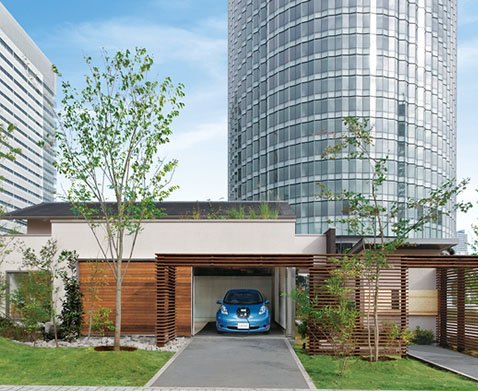The Big Chargeback: Leaf Powers House

Ever since the power went out in large parts of Japan after a massive Tsunami slammed into the country on March 11, the big question no longer is “will I be able to charge my EV at home.” It is: “Will I be able to power my house with my car?” This may seem alien to you, but a Tsunami has certain effects, and this is one of them. At a press conference in Yokohama, reporters asked Nissan’s CEO Carlos Ghosn: “When will it discharge?” Meaning the Leaf into the house. A few days later, Toyota showed a house that can be powered by a plug-in Prius should the lights go out. Now Nissan finally shows its great chargeback solution.
In front of Nissan’s global headquarters in Yokohama, on one of the world’s priciest waterfront properties, Sekisui House Ltd. erected a model home that can draw electricity from the lithium-ion batteries in a Nissan LEAF.
With this system, Nissan LEAF can be used as a backup battery in case of a power outage. The batteries in a LEAF store up to 24kWh of electricity, enough to power an average Japanese household for about two days, says Nissan.
The electronic gadgetry appears to be farther ahead that Toyota’s where the reverse charge still needed a bit of work when we inspected the home. If needed, electricity stored in Nissan LEAF can be supplied to a house by connecting the car to the house’s electricity distribution panel using a connector linked to the LEAF’s quick charging port. The connector complies with the CHAdeMO Association’s protocol for quick chargers.
Current Nissan LEAF owners can use the system as long as they make the needed adjustments to the home wiring. More information (in Japanese) here.

Bertel Schmitt comes back to journalism after taking a 35 year break in advertising and marketing. He ran and owned advertising agencies in Duesseldorf, Germany, and New York City. Volkswagen A.G. was Bertel's most important corporate account. Schmitt's advertising and marketing career touched many corners of the industry with a special focus on automotive products and services. Since 2004, he lives in Japan and China with his wife <a href="http://www.tomokoandbertel.com"> Tomoko </a>. Bertel Schmitt is a founding board member of the <a href="http://www.offshoresuperseries.com"> Offshore Super Series </a>, an American offshore powerboat racing organization. He is co-owner of the racing team Typhoon.
More by Bertel Schmitt
Latest Car Reviews
Read moreLatest Product Reviews
Read moreRecent Comments
- Add Lightness I don't waste a lot of time watching nothing much happening by watching the YouTube 6 minute highlights.
- MrIcky from my rental fleet experience, id rather drive one of these than a camry.
- Add Lightness Protectionist fear competition under the guise of paranoia.
- Kjhkjlhkjhkljh kljhjkhjklhkjh But facebook, instagram, twitter, your cell phone, your chevy/ford/dodge, your debit card, your credit card selling your data to the SAME OVERSEAS DATABROKERS is ok.Meanwhile parler, telegram literally run on russian hardware is also ''ok''
- Redapple2 Dear lord ! That face. HARD NO.



































Comments
Join the conversation
I have a very small inverter (2500W) that I hook to my car battery to power the house during outages (I live in a seismic area). Haven't used it yet. I expect to be able to run the fridge and a few flourescent lights, adequate for a few weeks until power is restored. 500W per hour is doable. There are three adults and three children in our house and our average winter daily electrical use is 12kw per day and about 8kw per day in the summer.
This could be a great feature when coupled with "green" companies that provide free charging at work for their employees. Of course the irony is that people will be using a very much less efficient electricity delivery system, more than nullifying the theoretical efficiencies of the electric cars. Hey, maybe California will put in free charging stations open to the public!